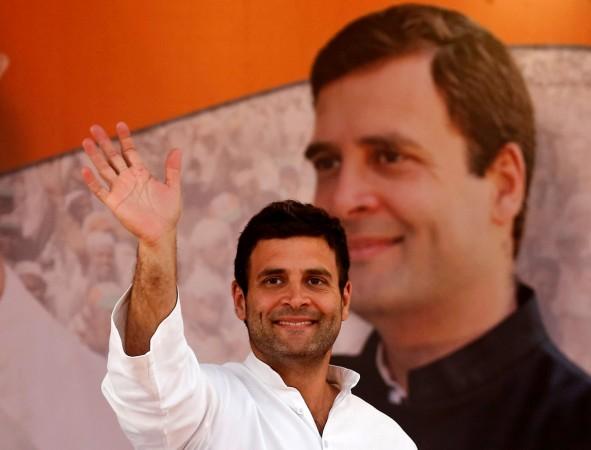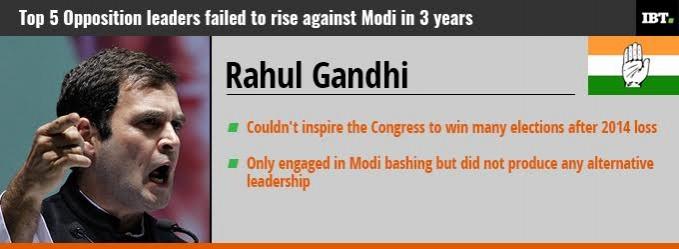
The Congress's eternal story is in the headlines again. Rumours are strong again that the party's vice-president – Rahul Gandhi – is likely to be elevated as the president in October this year, replacing current president and his mother Sonia Gandhi.
The rumour gained momentum in the Congress's Working Committee meeting on Tuesday, June 6, as Sonia Gandhi urged her party colleagues that the organisation of the Congress must be strengthened and the organisational elections be completed with "utmost speed and sincerity".
Now, the question is: What difference will Rahul Gandhi's elevation make for the Grand Old Party?
Congress has lost the Rahul Gandhi plot
The Congress has completely lost the plot on Rahul over the last few years, especially after the meteoric rise of Narendra Modi on the national stage. Till the end of 2012 when the BJP-led NDA was still not in a shape, the Congress had taken things lightly, believing that just like 2009 when the BJP bit the dust under the leadership of an ageing Lal Krishna Advani, 2014 would not be much different for they had 42-year-old Rahul Gandhi in the ranks, still untested in politics and a ready successor to former prime minister Manmohan Singh.
But Modi played a spoilsport. Following the failure of the Congress and the Gandhis to stop Modi from winning Gujarat for the third consecutive time and the growing dissent against the then UPA II government over corruption charges, the Congress lost the confidence to project Rahul Gandhi as its next leader and the man, who was waiting to find the right opportunity, never got it at all.
In fact, at the Chintan Shivir held in Jaipur in January 2013, the Congress made Rahul the vice-president of the party, a post which has not been that popular in the Congress, stopping short of making him either the president or the prime ministerial candidate.
Rahul Gandhi's first year as the vice-president was ordinary
Rahul Gandhi's first year as the vice-president was ordinary. He virtually did nothing apart from eulogising his family and reducing the party's non-Gandhi prime minister into a caricature over a bill to shield tainted politicians at a press meet. Electorally, the Congress was decimated in states like Madhya Pradesh, Chhattisgarh and Nagaland and also lost power in Delhi and Rajasthan. The party was successful in toppling the BJP in Karnataka but the reason was more the saffron party's internal squabble than Rahul Gandhi.
Modi, on the other hand, did the exact reverse. He spearheaded the BJP in various state elections and rose through the ranks of the NDA, eventually becoming its prime ministerial candidate overcoming several hurdles within. He was addressing apolitical platforms, too, giving his identity a greater reach.
Modi's constant 'sultanat' and 'shehzade' jibes made life tough for Rahul
The Congress found itself in a spot. There was not just the anti-incumbency mood but also a proactive leader in the Opposition ranks who was making full use of it. Modi made it a point to attack the 'sultanat' and 'shehzade' regularly, making it impossible for Rahul Gandhi to stay away from the contest. The Congress tried its best to give Rahul Gandhi an image makeover to compete with Modi but by then, the latter had taken an unassailable lead.

From emotion to anger, Rahul tried everything to make his point but it didn't happen
While we saw a Rahul Gandhi uttering "poison is power" at the Jaipur session and stressing points in an emotional tone, a fiery leader was witnessed at the AICC meeting held at the Talkatora Stadium in New Delhi in January 2014. Pitching his voice up, Rahul spoke with a combative body language, trying to boost his party workers who perhaps saw the writing on the wall.
But even the daring approach of the vice-president, who was continuously shielded by the party from exposure, did help little as the Congress was reduced to its lowest ever score in the Lok Sabha within four months of that speech. And it was just the beginning of the worse scenario.
Between May 2014 and May 2017, the Congress lost state polls in Andhra Pradesh, Telangana, Odisha, Maharashtra, Haryana, Jammu & Kashmir, Jharkhand, Delhi, Kerala, Assam, West Bengal, Tamil Nadu, Uttarakhand and Uttar Pradesh besides failing to form governments in Goa and Manipur despite leading in the number of seats. The party could only win in Puducherry and Punjab and came to power in coalition with the RJD and JDU in Bihar.
The worry for the Congress is that it has contested all these elections under the leadership of Rahul and not Sonia and lost. If a party fails to get encouraged by its future leadership, then it is in a serious trouble. Rahul Gandhi is a spent force before he even started and his elevation now means nothing.
Rahul has failed to impress as a leader; he has never been an administrator either
Another major disadvantage of the Congress is that even regional leaders like Mamata Banerjee, Nitish Kumar and Arvind Kejriwal grab more headlines as politicians and administrators today than Rahul Gandhi, who has not only failed to impress as a leader but also has zero administrative experience.
These have crippled his image and chance to rise to a position to challenge Prime Minister Narendra Modi. It is surprising that the Congress still finds Rahul Gandhi's elevation an occasion to celebrate while the reality is that such a step will only harm the party more.
If the Congress is trying to project Rahul as a fresh alternative to Modi in the 2019 Lok Sabha elections by considering his elevation now, still it is not going to be much helpful. The man's image has been permanently damaged and as long as he is taking on the PM, the latter's stay in office only looks more safe.















